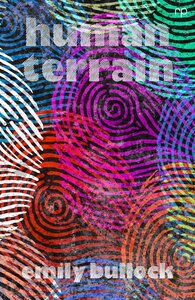It’s ten years now since I read ‘My Girl’, the story that won Emily Bullock the Bristol Short Story Prize. So many things have changed in that time, but I could still recall the atmosphere of that story. ‘My Girl’ is here again at the start of Human Terrain, Bullock’s new collection from Reflex Press. It was a pleasure to re-read: narrated by a mother acting as cutman for her daughter in a boxing match, it switches between a vivid account of the present fight and reflecting on the events that brought the pair to where they are. ‘My Girl’ is a story that works equally as well taken at face value and as a metaphor for the characters’ relationship.
Like ‘My Girl’, the title story of Human Terrain places its protagonist in a situation that may or may not be read as, real in order to illuminate a mother-daughter relationship. A woman stands at the front of a lecture theatre, but this isn’t going to be the standard War Studies lecture that the students are expecting. The narrator wants to tell the audience about her daughter in Iraq, a much more personal story than the dispassionate accounts they’re used to. History isn’t in the textbooks, she says, but neither is it quite in her daughter’s story – the truth for her is something more raw and brutal.
Bullock’s characters are often facing situations that embody the tensions in their lives, but sometimes her stories document a more abrupt change. ‘Zoom’ is set in rural Lincolnshire, where a boy has a school assignment called “Getting to Know Your Neighbours”. But his neighbours aren’t so easy to approach, so he’s taken to filming them instead of trying to interview them. There’s an irony in that the boy doesn’t get to know his neighbours that well at all through the filming , as the story’s sudden, powerful ending illustrates.
Perhaps my favourite story in Bullock’s collection is ‘Open House’. In this, Freddie sees that his childhood home is up for sale, and decides to pay a visit during the open house, the first time he’s been back to Whitechapel in twenty years. What he finds is an uneasy mixture of the past coming back to him while the present unspools out of his grasp. “A person’s life shouldn’t be an open house,” Freddie thinks, “for strangers to trample through and pick over”. It’s a pointed sentiment in a collection of vivid portraits.

Recent Comments